2020 AAG Specialty and Affinity Group Awards

The AAG’s 75 interest-based specialty groups and eight affinity groups recognize their members accomplishments over the course of the year. Following are the awardees within each group for 2020:
Africa Specialty Group
Florence Margai Paper Competition Award
- Moses Kansanga
- Emmanuel Kyeremeh, University of Western Ontario
Applied Geography Specialty Group
Research Awards
- Fikriyah Winata
- Emily Barrett
- Abby Therese Boylan
- Wataru Morioka
- Paula Perilla Castillo
- Alana Rader
- John Swab
- Junghwan Kim
Asian Geography Specialty Group
AK Chakravarti Award for Best Paper South Asia, Kevin Inks
Best Student Paper Award
- Yining Tan
- Sharif Abdul Wahab (runner up)
Biogeography Specialty Group
M.A. Student Research Grant, Keonhak Lee
Ph.D. Research Grant Award, Audrey Denvir
Masters Student Research Award, Keonhak Lee, Seoul National University, Ecological and geomorphological changes after radical coastal management in a temperate dune, South Korea
Ph.D. Student Research Award, Audrey Denvir, University of Texas-Austin, Avocados Become a Global Commodity: Consequences for Forest Carbon
James J. Parsons Award for Lifetime Achievement in Biogeography, Janet Franklin, University of California-Riverside
Cartography Specialty Group
CSG Master’s Thesis Grant, Levi Westerveld
Master’s Thesis Grant Award, Yuhao Kang
China Specialty Group
Best Paper Award
- Ronghao Jiang
- Samuel Kay (1st runner up)
- Jiang Chang (2nd runner up)
Climate Specialty Group
Lifetime Achievement Award, Mark Schwartz
John Russell Mather Paper of the Year, Matthew Dannenberg
Coastal and Marine Specialty Group
Norbert Psuty Student Paper Competition
- Zachary Hilgendorf (winner)
- Joshua Hodge (honorable mention)
Critical Geographies of Education
Dissertation Award, Shereen Fernandez
Cultural and Political Ecology
Field Study Award
- Zachary Goldberg
- Kripa Dongol
Scholar Activist Award, Jennifer Rice
Student Paper Award
- Elizabeth Shoffner
- Kevin Inks
Cultural Geography Specialty Group
Denis Cosgrove Ph.D. Research Grant, Michelle Padley
Scholar Award, Elizabeth Sibilia
Bychkov Ph.D. Paper Award, Samuel Neilson
Cyberinfrastructure Specialty Group
Robert Raskin Student Competition
- Alexander Michels, University of Illinois Urbana-Champaign, Particle swarm optimization for calibration in spatially explicit agent-based modeling (1st place)
- Yun Li, George Mason University, A spark and density-based algorithm for clustering multivariate geospatial raster data (2nd place)
- Jiaxin Du, New Jersey Institute of Technology, Interactive visual analytics for sparse trajectory data (3rd place)
- Zhiqian Wang, George Mason University, A comprehensive analysis for spatiotemporal metadata in NASA EARTHDATA portal based on data relevancy and intelligent algorithms (4th place)
- Kejin Cui, University of Southern California, Regional environmental cognition: the spatial-temporal semantic analysis of different responses about environmental topics on social media (4th place)
Disability Speciality Group
Todd Reynolds Competition Award, Xuan Zhang
Economic Geography Specialty Group
Best Dissertation Award, Catherine Jampel, Scales of Inclusion: Disability Employment in the U.S. Federal Government and Fortune 500 Companies
Best Student Paper Award, Lisha He, The rise of Chinese foreign investment in the United States: Disentangling investment strategies of state-owned and private enterprises
Student Research Award, Melissa Haller
Energy and Environment Speciality Group
Dissertation Data & Field Work Award, Sara K. Peterson
Earl Cook Award for Best Paper, Danya Al-Saleh
Professional Geographer Award, Michael Simpson
Travel Award
- Dong Liu
- Natallia Diessner
- William Delgado
Ethnic Geography Specialty Group
Ethnic Geography Specialty Group Outstanding Dissertation Proposal Award, Sara Tornabene, University of North Carolina at Charlotte, Latinx’ Diverse Economies in the United States: Understanding the Emergence, Development, and Socio-spatial Implications of Collaborative Food Practices in Boston (MA) and Charlotte (NC)
Ethnic Geography Specialty Group Student Paper Award, Qiuxi Li, Cultural Preservation Dilemmas Under Disaster Risk and Modernization – A case study of Chinese traditional villages
Ethnic Geography Specialty Group Early Career Award, Caroline Faria, University of Texas at Austin
Ethnic Geography Specialty Group Distinguished Scholar Award, Qingfang Wang, University of California at Riverside
Ethnic Geography Specialty Group Distinguished Service Award, Heike Alberts
Eurasian Specialty Group
Graduate Paper Award
- Chelsea Cervantes De Blois
- Samuel Nielson
Feminist Geographies Specialty Group
Glenda Laws Student Paper Award, Cynthia Morinville
Jan Monk Service Award
- Lynda Johnston
- Lorraine Dowler
Susan Hanson Dissertation Proposal Award, Gabrielle Kirk
Geographic Information Science and Systems
Best Student Paper, Seonga Cho (2nd place)
Master’s Thesis Grant Award, Yuhao Kang
Geographies of Food and Agriculture
Graduate Research Award
- Erica Zurawski
- Rebecca Wolff
Geomorphology Specialty Group
Reds Wolman Research Award, Anais Zimmer
Graduate Student Affinity Group
Travel Award
- Theresa Johnson
- Shelby Loft
Hazards, Risks, and Disasters Specialty Group
Dissertation Award, Yago Martin Gonzalez
Gilbert White Thesis Award, Jennifer Langill
Health and Medical Geography
Jacques May MA Thesis Award, Elaina D Gonsoroski
Peter Gould Paper Award, Lirong Kou
Travel Award
- Fikriyah Winata
- Lirong Kou
- Shelby Loft
Human Dimensions of Global Change
Student Research Award, Alana Rader
Latin America Specialty Group
Best Paper Award, Diego Melo Ascencio, University of Colorado, Reframing the Legal Personhood of Rivers and Forests in Colombia: A Critique of Liberal Territoriality Through an Emphasis on Extractivism, Racialization, and the Hegemony of Rights
Field Study Award Ph.D., Claudia Diaz-Combs, Syracuse University, Project title: From Repression to Resistence: Environmental Social Movements in Ecuador
Field Study Award M.A./M.S., Natalie Gordon, University of Wyoming, Project title: Social Reproduction and Identity Politics of the Coca Leaf in Bolivia
Media and Communications
Stan Brunn Award
- Hilary Faxon (runner up)
- Dylan Harris(runner up)
Middle East Specialty Group
Student Paper Award
- Danya Al-Saleh
- Hanieh Molana
Mountain Geography Specialty Group
Chimborazo Student Research Grant Award, Anais Zimmer
Mauna Kea Student Presentation Award, Danika Mosher
Paleoenvironmental Change
Butzer Award, Glen Sproul dit MacDonald, UCLA,
Mosley Thompson Award, Jiaying Wu, University of Georgia, Wu et al. Wu, J., Porinchu, D., Horn, S.P. 2019. Late Holocene hydroclimate variability in Costa Rica: Signature of the Terminal Classic Drought and the Medieval Climate Anomaly in the northern tropical Americas. Quaternary Science Reviews 215: 144–159.
Political Geography
Travel Award, Sanan Moradi
Dissertation Award, Jennifer McGibbon
Graduate Student Paper Award
- Jonghee Lee Caldararo
- Hilary Faxon
Travel Award
- Sharif Abdul Wahab
- Sameera Ibrahim
- Dylan Brady
- Isabel Airas
- Esra Alkim Karaagac
Undergraduate Paper Award, Sara Kaminski
Julian Minghi Distinguished Book Award, Lindsay Naylor, University of Delaware, Fair Trade Rebels: Coffee Production and Struggles for Autonomy in Chiapas (University of Minnesota Press)
Richard Morrill Public Outreach Award, Austin Kocher, TRAC Reports/Syracuse University
Stanley D. Brunn Junior Scholar Award, Andrew Curley, University of North Carolina/University of Arizona
Virginia Mamadouh Outstanding Research Award, Kate Coddington, SUNY Albany, The slow violence of life without cash: borders, state restrictions, and exclusion in the U.K. and Australia (Geographical Review 2019)
Population Specialty Group
Lifetime Achievement, Patricia Gober
Queer and Trans Geographies Specialty Group
Paper Competition
- Suad Jabr (1st place)
- Jacklyn Weier (2nd place)
Recreation, Tourism, and Sport
Paper Competition
- Minji Kim (winner)
- Danielle Nagle (runner up)
- Michelle Harangody (runner up)
- J.A. Cooper (runner up)
John Rooney Award, Jarkko Saarinen
Roy Wolfe Award, Patrick Brouder
Remote Sensing
RSSG Student Illustrated Paper Competition Award
- Yanzhe Yin, University of Georgia, Identifying urban heat vulnerability by integrating foot-traffic information with remote sensed temperature (1st place)
- Thomas Bilintoh, Clark University, Methods to compare cases concerning categorical transitions during various time intervals (2nd place)
- Kayla Bradford, University of Wisconsin – Whitewater, Remote sensing of the urban heat island effect in Wisconsin (3rd place)
RSSG Student Honors Paper Competition Award
- Zijun Yang, University of Illinois at Urbana-Champaign, A robust hybrid deep learning modeling framework for spatiotemporal image fusion (1st place)
- Dao Phuong, University of Toronto, Improving hyperspectral image segmentation by applying inverse noise weighting and outlier removal for optimal scale selection (2nd place)
- Ying Lu, University at Buffalo, Automatic training sample collection method for timely large-scale mangrove mapping (3rd place)
- Jie Dai, San Diego State University, Mapping understory invasive plant species with field and remotely sensed data in Chitwan, Nepal (3rd place)
Spatial Analysis and Modeling
John Odland Award
- Ziqi Li (1st place)
- Nana Luo (2nd place)
- Paul Jung (3rd place)
Stand Alone Geographers Affinity Group
Helen Ruth Aspaas Innovator Award, Daniel Novik Warshawsky
Transportation Geography
Dissertation Award, Joris Beckers
Masters Thesis Award, Grace Chen
Student Travel Award
- Aimee Krafft, University of Nevada-Reno
- Elina Shepard, University of North Carolina – Charlotte
Edward L. Ullman Award, Julie Cidell, University of Illinois at Urbana-Champaign, for her contributions to the field of Transportation Geography
Urban Geography Specialty Group
Dissertation Award
- Lea Ravensbergen-Hodgins
- Myungln Ji
Glenda Laws Undergraduate Paper Award, Holden Dempsey
Graduate Fellowship Ph.D., Maegan Miller
Graduate Paper Award, Melissa Heil
Water Resources Specialty Group
Gilbert White Distinguished Career Award, Dr. Christopher Lant, Utah State University
Olen Paul Matthews and Kathleen A. Dwyer Fund for Water Resources Award, Birendra Rana, University of Nevada-Reno
Student Research Proposal, Joseph Dehnert, University of Montana
Student Research Presentation, Jaclyn Best, Oregon State University
Student Research Paper
- Andrea Beck, Massachusetts Institute of Technology
- Porcha McCurdy, East Tennessee State University
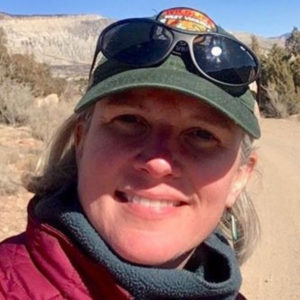 Position: GIS and Technical Support Program Manager, West Virginia Division of Natural Resources, Wildlife Resources Section: Supporting Game Management, Fish Management, Environmental Coordination, Wildlife Diversity and Natural Heritage with geographic information systems, data, and planning needs.
Position: GIS and Technical Support Program Manager, West Virginia Division of Natural Resources, Wildlife Resources Section: Supporting Game Management, Fish Management, Environmental Coordination, Wildlife Diversity and Natural Heritage with geographic information systems, data, and planning needs.


 There are always new titles in geography and related disciplines to be found on the New Books in Geography list. Some of these books will be reviewed in the AAG Review of Books. Persons wishing to volunteer their reviewing services for new books should have the requisite qualifications and demonstrable prior knowledge and engagement with the subject area, preferably through publications. Please contact the editors at
There are always new titles in geography and related disciplines to be found on the New Books in Geography list. Some of these books will be reviewed in the AAG Review of Books. Persons wishing to volunteer their reviewing services for new books should have the requisite qualifications and demonstrable prior knowledge and engagement with the subject area, preferably through publications. Please contact the editors at 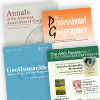 In addition to the most recently published journal, read the latest issue of the other AAG journals online:
In addition to the most recently published journal, read the latest issue of the other AAG journals online: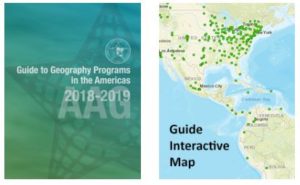
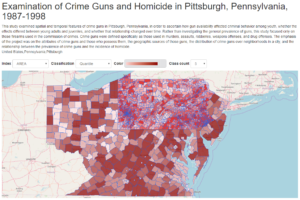
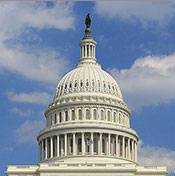
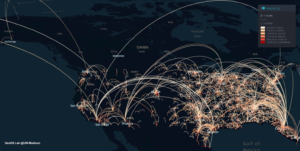
 With the cancellation of the in-person AAG Annual Meeting due to restrictions on travel and gathering during the COVID-19 pandemic, the 2020 World Geography Bowl has regrettably been canceled. The World Geography Bowl Executive Committee and the AAG wish to acknowledge the students who qualified for their regional geography bowl teams and who will not get a chance to participate in what is a highly anticipated event for students, spectators, and volunteers alike. We look forward to an exciting bowl at the 2021 AAG Annual Meeting in Seattle April 7-11!
With the cancellation of the in-person AAG Annual Meeting due to restrictions on travel and gathering during the COVID-19 pandemic, the 2020 World Geography Bowl has regrettably been canceled. The World Geography Bowl Executive Committee and the AAG wish to acknowledge the students who qualified for their regional geography bowl teams and who will not get a chance to participate in what is a highly anticipated event for students, spectators, and volunteers alike. We look forward to an exciting bowl at the 2021 AAG Annual Meeting in Seattle April 7-11!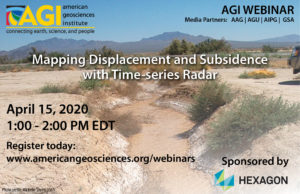 The American Geosciences Institute is offering a free webinar titled Mapping Displacement and Subsidence with Time-series Radar on April 15, 2020. In this webinar, experts from Hexagon and the Arizona Department of Water Resources will discuss the use of time-series displacement maps with a high point density for monitoring and mitigating subsidence due to subsurface extraction of resources such as water or hydrocarbons. Speakers at the webinar include Derrold Holcomb, Product Manager, Advanced Sensor Software, Hexagon Geospatial; and Brian Conway, Geophysics Unit Supervisor, Arizona Department of Water Resource.
The American Geosciences Institute is offering a free webinar titled Mapping Displacement and Subsidence with Time-series Radar on April 15, 2020. In this webinar, experts from Hexagon and the Arizona Department of Water Resources will discuss the use of time-series displacement maps with a high point density for monitoring and mitigating subsidence due to subsurface extraction of resources such as water or hydrocarbons. Speakers at the webinar include Derrold Holcomb, Product Manager, Advanced Sensor Software, Hexagon Geospatial; and Brian Conway, Geophysics Unit Supervisor, Arizona Department of Water Resource.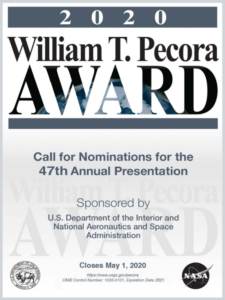 The William T. Pecora Award is presented annually to individuals or groups that have made outstanding contributions toward understanding the Earth by means of remote sensing. The Department of the Interior (DOI) and the National Aeronautics and Space Administration (NASA) jointly sponsor the award. The award was established in 1974 to honor the memory of Dr. William T. Pecora, former Director of the U.S. Geological Survey and Under Secretary, Department of the Interior whose work was integral in helping to establish the Landsat satellite program. The Award Committee must receive nominations for the 2020 award by May 1, 2020.
The William T. Pecora Award is presented annually to individuals or groups that have made outstanding contributions toward understanding the Earth by means of remote sensing. The Department of the Interior (DOI) and the National Aeronautics and Space Administration (NASA) jointly sponsor the award. The award was established in 1974 to honor the memory of Dr. William T. Pecora, former Director of the U.S. Geological Survey and Under Secretary, Department of the Interior whose work was integral in helping to establish the Landsat satellite program. The Award Committee must receive nominations for the 2020 award by May 1, 2020.